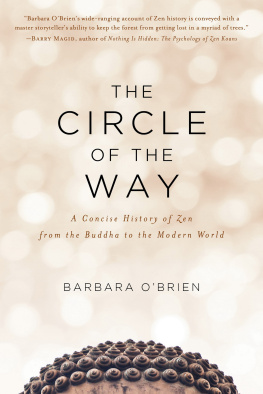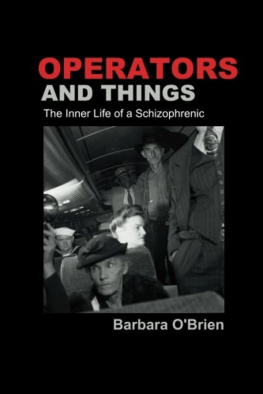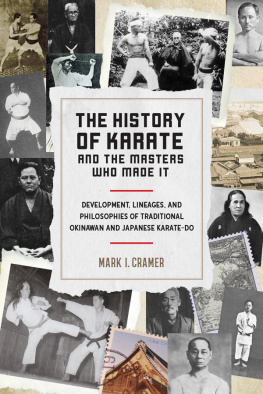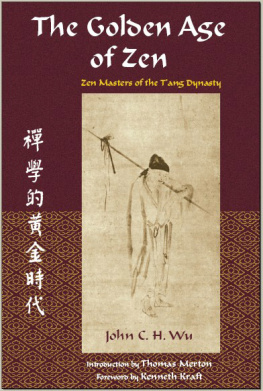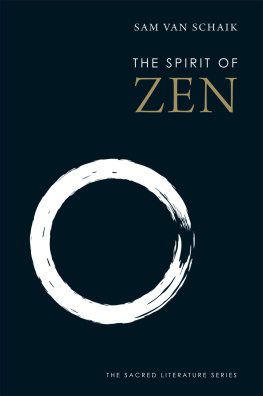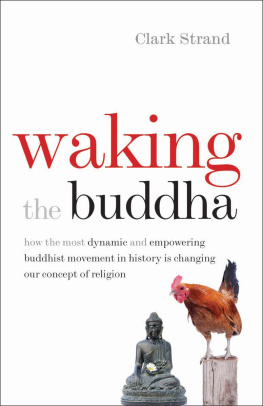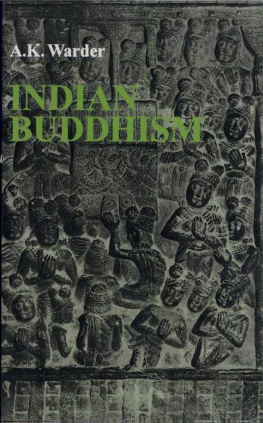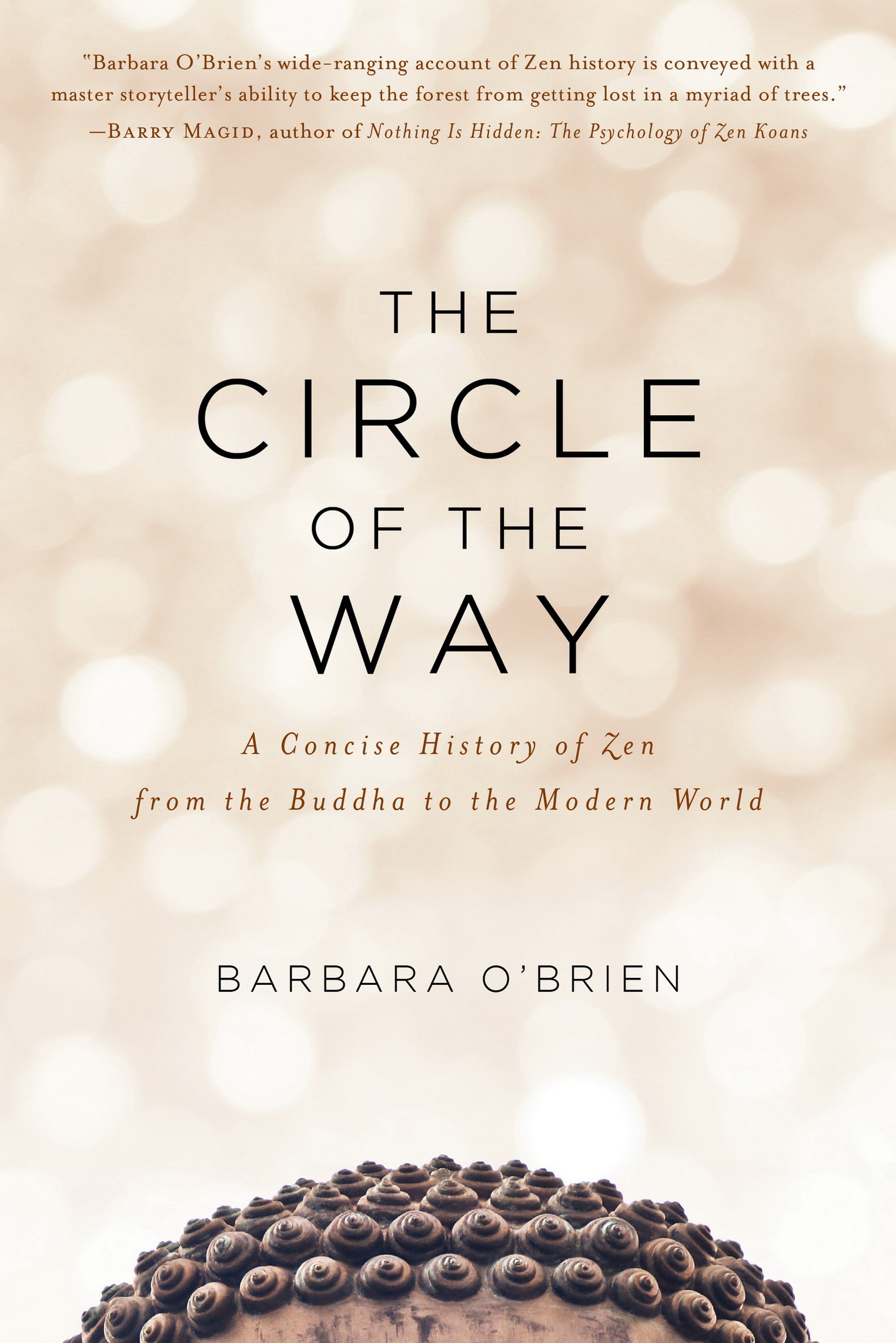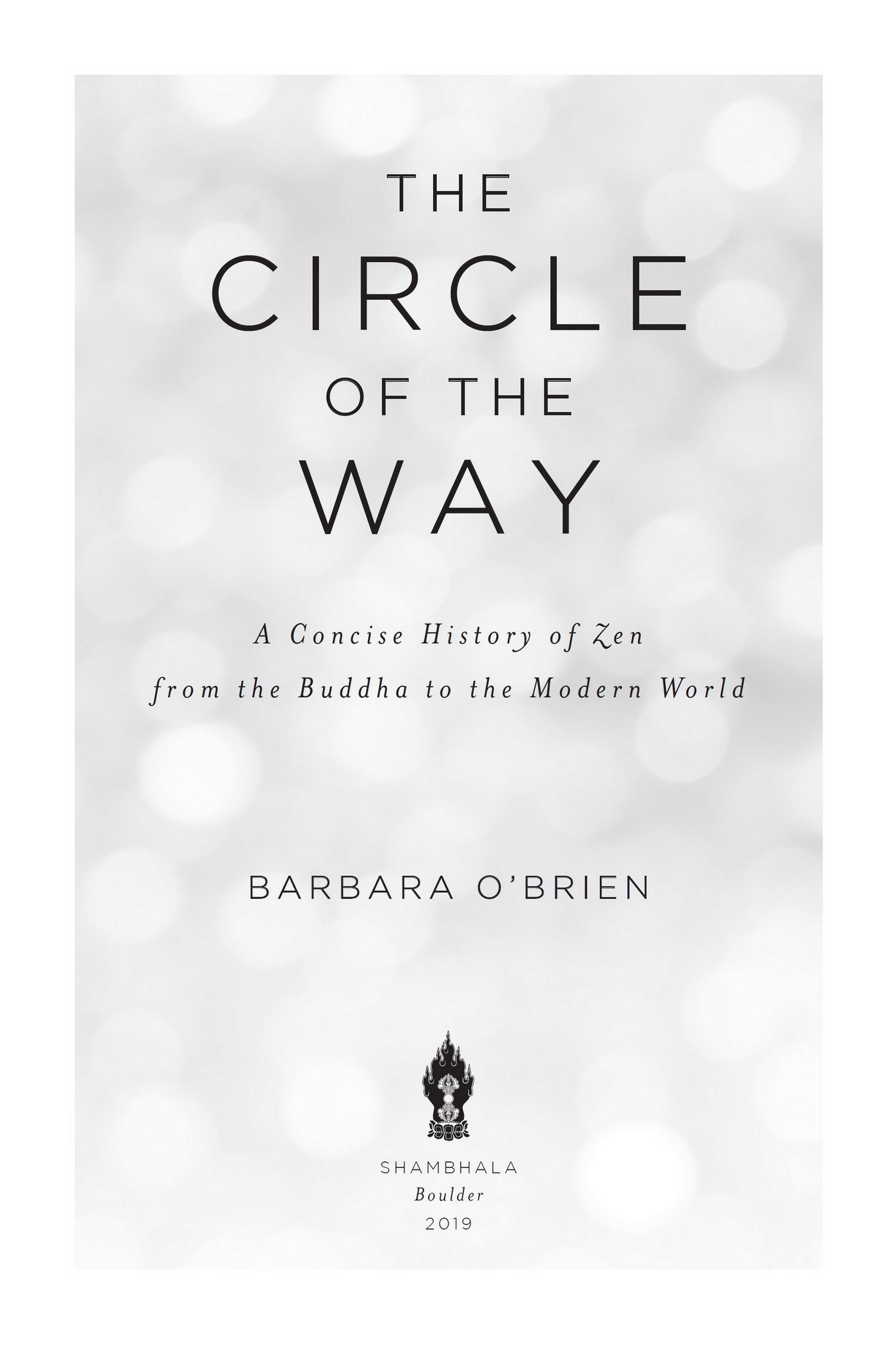Contents
Landmarks
Print Page List
A comprehensive history of Zen Buddhism written by and for Zen practitioners in an inviting, accessible style. It features many of the classic, sometimes hilarious stories that make the Zen tradition so rich.
D ALE S. W RIGHT ,
author of What Is Buddhist Enlightenment?, Philosophical Meditations on Zen Buddhism, and co-editor of a series of five books on Zen history
Whenever I want a succinct, trustworthy, well-researched exploration of a Buddhist topic, I go to Barbara OBriens work. In this wonderful offering, we receive a much-needed history of how Zen came to be what it is today. In her deft way, OBrien balances traditional narratives with historical scholarship, telling a story that one trusts immediately to be thoroughgoing. The Circle of the Way is another example of OBriens great gift for synthesis and scholarship, and a tremendous gift to everyone interested in the Zen way.
B ONNIE M YOTAI T REACE ,
founding teacher at Hermitage Heart Zen and author of Winter Moon: A Season of Zen Teachings
Barbara OBriens wide-ranging account of Zen history is conveyed with a master storytellers ability to keep the forest from getting lost in a myriad of trees. Wearing her scholarship lightly, she blends just the right amount of skepticism about her hagiographic sources with a deep appreciation for the Dharma.
B ARRY M AGID ,
author of Nothing Is Hidden and Ending the Pursuit of Happiness
The Circle of the Way is a wonderful addition to a Zen library. This book manages to educate without lecturing, to address controversy without attack, and to cover an old topic in a refreshing and humorous way. An amazingly clear explanation of what parts of the history have previously been accepted but should be questioned, as well as those that have now been verified.
G RACE S CHIRESON ,
author of Zen Women: Beyond Tea Ladies, Iron Maidens, and Macho Masters
Finally! A clear and concise introduction to Zen Buddhism. The Circle of the Way fills a long-standing need for a simple, straightforward explanation of where Zen comes from, what the foundational teachings are, and how they coalesce as a school of Buddhism. OBrien loves the subject but never lets it take itself so seriously as to miss the lively mix of Zens internal contradictions and its profound teachings. This is a wonderful book.
J AMES I SHMAEL F ORD ,
author of Introduction to Zen Koans: Learning the Language of Dragons
Shambhala Publications, Inc.
4720 Walnut Street
Boulder, Colorado 80301
www.shambhala.com
2019 by Barbara OBrien
All rights reserved. No part of this book may be reproduced in any form or by any means, electronic or mechanical, including photocopying, recording, or by any information storage and retrieval system, without permission in writing from the publisher.
Cover photograph of Buddha by Volanthevist/Getty Images
Cover design by Claudine Mansour Design
Book design by Claudine Mansour, adapted for ebook
ISBN:9781611805789
eISBN9780834842434
Library of Congress Cataloging-in-Publication Control Number: 2019028954
v5.4_r1
a
DEDICATED TO
COL. ROBERT W. THOMAS
19462014
I miss you, bro.
Contents
In Appreciation
Those who made this book possible include three Zen teachers: my dharma gate teacher, John Daido Loori (19312009); my heart teacher, Tokudo Jion Susan Postal (19402014); and Myozan Shofu Dennis Keegan (19472016), who famously channeled Dogen and who advised me to stop capitalizing suchness. Youre objectifying it, he said. Dont do that. This proved to be wise advice. In honor of Dennis, suchness will not be capitalized in this book. Well, unless it begins a sentence.
I also thank and miss my brother and sister students from Empty Hand Zen Center in New Rochelle, New York, and the Zen community of the Fire Lotus Temple, Zen Center of New York City, in Brooklyn. Fire Lotus is a branch of Zen Mountain Monastery (ZMM) in Mount Tremper, New York, where I first encountered Zen. I trust ZMM and affiliates will continue to thrive under the wise and compassionate leadership of Abbot Geoffrey Shugen Arnold. I hope also that Empty Hand will blossom anew with the right guiding teacher someday.
The Shambhala editor emeritus Dave ONeal, who encouraged me to write a book and helped get this one accepted, deserves special recognition. I would like to think that Daves subsequent retirement didnt have anything to do with this book.
I send much love and thanks to my aunt and uncle, Liz and Clyde Faries, who let me stay in their house while I was writing this book and did not complain when I made a mess of the breakfast room.
I also thank the crew at Al Fusho Rapaports Zen Dialogue Facebook group, including Stephen Slottow, who sent me some invaluable tips; James Ishmael Ford, who gave me a helpful preview of his lovely book Introduction to Zen Koans; and Barry Magid, from whom I have stolen a line about people who hate opera. Special thanks also to Jamie McLeod, Russell Mitchell, David Isurushin, and John Shoji Sorensen.
And for everyone in the seven directions and three times engaged in the great collaborative effort that is Zen, I am profoundly grateful. May we practice with infinite kindness to the past, infinite service to the present, and infinite responsibility to the future.
B ARBARA H OETSU OB RIEN
October 16, 2018
Introduction
A ZEN HISTORY?
I was living in the Fire Lotus Zen Temple in Brooklyn when another student came into the library and asked for a history of Zen. The only one available was the two-volume work by Heinrich Dumoulin (190595), first published in English in 1988. I believe this is the only attempt anyone has made at a comprehensive Zen history in a Western language, or in any language as far as I know. In recent years, many scholarly studies have been published dealing with aspects of Zen history, but theres no other single work walking the reader through the whole thing.
Dumoulins history is a worthy effort, but much of it has been contradicted by more recent scholarship. Further, Dumoulin was a Jesuit theologian, and his understanding of Zen itself went only so far.
I never heard how the other student got along with Dumoulin. But the experience made me think about how much I wanted a better history of Zen, especially one that was more succinct and better explained how Zen developed through the centuries. So I decided to write it myself. I hope this narrative will be useful to Zen students, providing background to their practice.
This book is also written for those who see the word Zen tacked onto everything from tech products to soap and wonder what it is. Since the Beats introduced Zen into Western popular culture in the 1950s, the term Zen has come to signify something wonderfully commercial if not definable. The word can, apparently, mean whatever one wants it to mean.
But the Zen tradition is far from a blank slate. It is a school of Buddhism that developed a unique approach to the Buddhas teachings. It has a rich heritage of literature. And it has a long and messy history.
This task is complicated by the fact that many of Zens traditional stories about itself are contradicted by historical scholarship. For that matter, modern scholars dont always speak with one voice about what really happened either. This makes the crafting of a single narrative quite the challenge. Which story do I tell? And what do we do with the traditional stories that dont match historical records?

